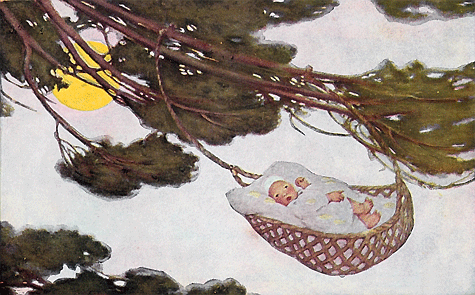 |
| What rough beast? |
I am interested in Yeats' “The Second
Coming” currently as it illustrates my thesis that Western
Civilization has never recovered from the First World War. It, along
with Eliot's “The Wasteland,” is perhaps the great poetic
statement of this in English—though there certainly are many
others. “There Will Come Soft Rains” was also written in the year
or two after the war ended.
I gather the usual interpretation of
“The Second Coming” is that it speaks of Yeats' concept of “The
Great Year,” with the idea that after two thousand years
Christianity has had its day and is about to be replaced by some new
paganism. Fair enough; but there is no need to read it this way.
After all, it is no suprise to any Christian that the Second Coming
of Christ would involve first the appearance of a “rough
beast”--that much is in the Book of Revelations. There is to be a
period of tribulation, and it is to last as long as a thousand years.
All quite orthodox, in fact.
 |
| Durer's Apocalypse, with two rough beasts apparent. |
I imagine the notion that the poem is
non-Christian, indeed somewhat anti-Christian, comes from the
identification of the “rocking cradle” that “vexed to
nightmare” “twenty centuries of stony sleep” with the birth of
Jesus. This would then imply that Christianity, if only over
millennia, actually caused the blood-dimmed tide now unleashed by the
rough beast of mere anarchy. But there are multiple problems with
this identification.
First, the birth and infancy of Jesus
is not, theologically speaking, as important as his death and
resurrection. So the poem, if this is its focus, would have slightly
misfired here. Second, it is common knowledge, and an essential
element of the mythos, that Jesus was not born in a cradle, but in a
manger. With Yeats' sensitivity to symbol, it seems incredible that
he would have muddled this—to actually make the synecdoche of a
cradle represent Jesus himself. This alone, I think, makes the
identification impossible, and care has been taken to ensure that
this is so.
But it also makes no sense in terms of
cause and effect to see the cradle referred to as the cause of both
the “twenty centuries of stony sleep” and the “vexing to
nightmare.” These are two different and quite disparate things. If
the twenty centuries of stony sleep refers to Christianity, the
vexing to nightmare cannot.
Finally, Yeats himself elsewhere
considers the height of civilization to have occurred in the
Byzantine Empire—a resolutley Christian context, the paradigm of a
time and place where Christianity ruled both the intellectual and the
political world. If things started to go wrong, it must have happened
sometime after 1000 AD.
The essential question in the poem,
therefore, the climax to which it all points, is the puzzle: who is
the baby in that rocking cradle?
Or, indeed, is there a baby in that
rocking cradle? For only the cradle, not the baby, is mentioned, as
if it were empty. Indeed, implicitly, it must be empty, in order to
be filled by the “rough beast” slouching to Bethlehem “to be
born.”
If one wracks the good old Spiritus
Mundi for some obvious and necessary referet for this rocking cradle,
it seems to me the first and strongest reference is to the best-known
English lullaby: “Rock-a-Bye Baby.” This nursery rhyme also
refers, in a way, to a cradle that is empty—at least, the baby and
cradle both fall. This feature of the rhyme is quite odd, and so
conspicuous—for centuries, people in English-speaking countries
have in fact lulled their babies to sleep with a story of some poor
child coming to disaster.
 |
| Bad parenting. |
But then who is the baby in ths nursery
rhyme?
There are a range of theories, and no
agreed answer, but I thing the most valuable piece of evidence is the
tune to which it is sung. It is a variant of an old Irish tune, as
Yeats would surely have known, “Lilibullero.” And Lilibullero is
a song about the Glorious Revolution of 1688, which overthrew James
II of England and replaced him with King William of Orange, with
historic consequences for both England and Ireland.
It seems reasonable then to guess that
the words of “Rock-a-Bye Baby” also refer to the same event. And
such coded references were indeed commonly necessary in such
turbulent times, and commonly used in Ireland. There are a lot of
historical examples of satiric rhymes used as political weapons in
Ireland.
It seems to me the suspicion is
reinforced by the perfect irony of using what was composed as a
military march, a war song, as a baby's lullaby. This sounds like
deliberate parody. It makes it all seem quite ominous.
 |
| Edmund Burke |
If this is true, the tree in which the
baby rocks is the tree of state, an image of the nation popularised
by the Irish statesman Edmund Burke, and influential enough that it
is still the logo of the British Conservative Party. The tree
represents a society's natural hierarchy: at the top of the tree, “in
the treetop,” is the royal family. This identification
is in fact explicit in one version of a later verse of the lyrics of
the nursery rhyme: “Rock-a-bye,
baby, thy cradle is green, Father's a king, and mother's a queen...”
 |
| British Conservative Party logo. |
The
baby, therefore, is a new heir born to the royal family. And this is
just what caused the Glorious Revolution in 1688. It was kicked off
more or less immediately by the unexpected birth to King James II of
a male heir, James Francis Edward. This caused great consternation in
some quarters, because James II's wife was openly Catholic, and
little James Francis was certain to be raised as a Catholic. The
“wind” that blew this innocent child off the top of the tree of
state, was then the famous “Protestant wind,” an unseasonably
favourable wind that blew William of Orange's ships from Holland to
England in 1688. This “Protestant wind,” a catch-phrase of the
time, is referred to as well in one popular version of the lyrics to
“Lillibulero.” Parliament cut a deal with William, naming him the
new king in return for ceding a great deal of the royal prerogatives
to Parliament, and James Francis Edward fled into exile.
 |
| James Francis Edward Stuart |
This
would seem to make Protestantism and the Reformation the true cause
of the rough beast of the Apocalypse. This may be so; Yeats was
nominally Protestant, but was not practicing, and was surrounded by
an overwhelmingly Catholic mileu. While considerations of class may
have prevented him from converting, a portion of his subconscious, at
least, might have favoured the old church. Nevertheless, the
religious angle does not quite fit. The Glorious Revolution and the
deposing of James II was not in this regard an epochal event in the
history of the world, only of the British Isles. If the Protestant
Rebellion was the trigger for the apocalype, it should have far more
naturally been traced back to something like the nailing of Luther's
theses to the door of Wurms Cathedral.
But
something else about the Glorious Revolution was epochal. It
effectively transferred British sovereignty from the king to the
people; and this was a first for Europe and for the post-Byzantine
world. Parliament, not the king, was now supreme, demonstrated by the
ability of Parliament to depose a king. At the same time, the
Glorious Revolution established the principle that the civil society
was supreme over religion: the people could also depose a church, and
dictate to the conscience of a king. This was both novel and
revolutionary. The Glorious Revolution led in a straight line, and
quite soon, to the political musings of Locke, and quite explicitly
to the doctrine of “no taxation without representation” that
triggered the later American Revolution, faounded on Lockean
doctrine, which in turn triggered the French, which triggered the
doctrine of Marx, the many revolutions of 1848, the ideal of
nationalism, the Chinese Revolution beginning in 1911, the Russian
Revolution of 1917, and the many revolutions, falls of monarchies,
and general drowning in blood of all ceremonies of innocence
following World War I, at the time that Yeats was writing this poem.
Indeed, the doctrine of nationalism can also be blamed for the
carnage of the Great War. Note that all the4se subsequent revolutions
also shared the essential feature of believing that politics was and
ought to be supreme over religion. This poison pill of “Liberalism”
caused it to be oppsosed by the Church for many decades.
Widening
gyres all beginning with the gentle rocking of one cradle.
The
loss of the religious centre of a society, “the ceremonies of
innocence,” is indeed a cause of social decline. It implies a
fundamental failure of the social consensus which allows societies to
function. This fact has been recognized almost everywhere and at all
times. It was understood by the Romans to be the cause of the decline
of the Roman Empire. Constantine then deliberately revived it for a
further thousand years through the formal adoption of Christianity.
It was the reason for the sudden rise of Islam in the seventh
century. It was the reason for the decline of the Koryo dynasty in
Korea; and on and on. A society must be united in its ideals.
 |
| Constantine, founder of Byzantium |
The
modern hope, which reached its apex in the nineteenth century, was
that society could find a new centre around the doctrines of liberal
democracy and science. New cathedrals were built, even higher than
the early Christian ones: the Washington Monument, the Eiffel Tower.
But this imagined centre has been losing mass rapidly since the First
World War. The poets and artists saw it first, in the 1920s. The
general population have taken a lot longer, busy destroying
Christianity in the name of false science and a false liberalism for
most of the years since, but are gradually coming, I think, to feel
the same thing in their guts. Perhaps in another fifty or a hundred
years, it will even occur to the academics, naturally the most
conservative element of society.
The
whole darned thing, Western Civ, looks like it is winding down to its
final whimper.


















